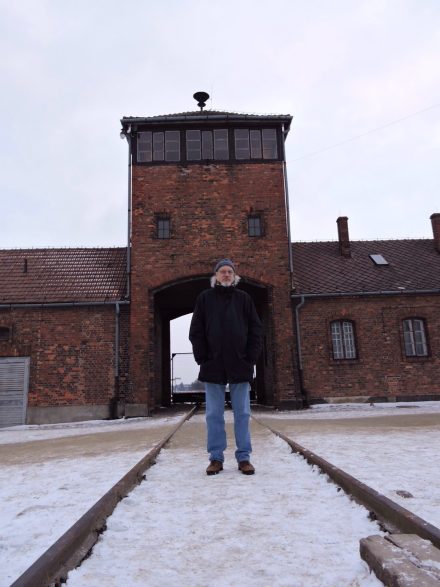Associate Professor of Journalism Richard Landesberg reflects on the impact leading the Winter Term course ‘Remembering the Holocaust’ has had on him over the years.
Powered by RedCircle

Four times.
Four times I’ve been to Auschwitz in winter with Elon students. And four times we were allowed to leave, get on a warm bus and go back to our nice hotel in Krakow. Four times we did what more than 1 million others never could.
Along with 28 students and my co-leader, A.J. Fletcher Endowed Professor of Strategic Communications Kenn Gaither, we traveled through Germany and Poland this January, paying respects at five different concentration/death camps, all the while searching for meaning and trying to wrap our minds around why this happened, and how humans can so cruelly treat other humans.
For our students, this is ancient history. The leadup to the Holocaust started almost a century ago, when radio was in its infancy, TV was experimental, and the internet was the stuff of science fiction. Most students have been taught something about the Holocaust or at least have read “The Diary of Anne Frank.” A few have studied the topic or have been steeped in it by family. Some had distant relatives who died in the Holocaust. Others are history buffs. All have an abiding interest in taking a course where they will be out in the cold, rain and snow, visiting places of unspeakable horror — and getting to leave and talk about it. You will hear historians say that history doesn’t repeat, but it rhymes. The students on this course get to experience the rhythm of history and how those threads connect to today.
“The horrors of the Holocaust are close to 100 years old and are as timely as today’s news.”
For many on this course, the topic is personal. We are all greatly aware of how we can be singled out as the “other.” For some, this can very much be a roots class. My own family was from Eastern Europe — Austria, Poland, Ukraine, Romania — all those countries where the borders changed frequently, with the one constant being the persecution of Jews. The shtetls, those little Jewish villages of the late 19th century, and the pogroms, the violent attacks on Jews in those areas, were what my grandparents escaped in the late 1890s as they made their way to America.
My family members were very much assimilated Jews, very much Americans, and far removed from the characters in “Fiddler on the Roof.” Despite being Bar Mitzvahed, I never embraced Judaism or any religion. But, as the Holocaust and recent events reinforced, that doesn’t matter. I am what I am. Those responsible for the Holocaust wouldn’t care if I was religious or not. And my students, Jewish, Black, gay, disabled — or of any background the murderers considered “undesirable” — they, too, would be caught up in the Holocaust.
The horrors of the Holocaust are close to 100 years old and are as timely as today’s news. Domestically, we read daily about antisemitisim, racism, attacks on the LBGTQ community and much more. Internationally, we read about modern attempts at genocide as governments and insurgents try to murder ethnic groups they don’t like. When we visit the death camps of the Holocaust, we stand where millions were beaten, gassed, starved and tortured. In the cold and snow, those souls get into us in a way that can’t be described but can only be felt. And once inside us, we can never let them go. They remind us to “never forget.” And they force us to remember our responsibility of “never again.”
Next January, I plan to be back on the road, seeing Auschwitz for the fifth time. Once again, I will see it differently as I look through the fresh eyes of another group of Elon students. My friends ask how I can go to these places so often. I think, how can I not?
Associate Professor of Journalism Richard Landesberg serves as an adviser for Elon News Network, the student-run media organization.


